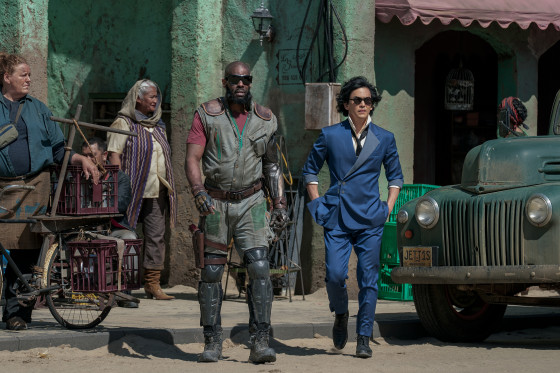Netflix released a live-action adaptation of the classic anime series, “Cowboy Bebop” on Nov. 19, 2021.
The original “Cowboy Bebop” premiered in Japan in 1998, and was first shown in the United States in 2001. The series is widely popular and considered an anime classic, featuring an iconic, jazzy score, dark, stylish imagery, and a permanent sense of listlessness.
Despite containing just 26 episodes and only running from 1998 to 1999, ‘Cowboy Bebop’ helped to popularize anime within the United States.
What the original series managed to accomplish in such a short amount of time is something that’s cherished and recognized by a global audience.
So Netflix decided to create a live-action version, even though live-action adaptations of popular animes have a pretty rough record already (looking at you, “Death Note”).
“Cowboy Bebop” takes place in a distant future where Earth has been deemed uninhabitable and the human race has colonized other planets.
Spike Spiegel (played by John Cho in the remake), a bounty hunter who travels through space to capture criminals, is accompanied by his partners, Jet Black (Mustafa Shakir) and Faye Valentine (Daniella Pineda) on their spaceship, Bebop.
Netflix’s synopsis reads: ‘“Cowboy Bebop” is an action-packed space Western about three bounty hunters, aka “cowboys,” all trying to outrun the past.”
In an interview with NBC Asian America, John Cho says, “This is the most intense job I’ve ever had, for sure, in what it required of me.”
The actor also admitted that he wasn’t familiar with the original anime series before his agent sent him the script for the remake.
The live-action series presents a number of differences from the original. One of the most notable changes lies within the character’s backstories.
Spike Spiegel’s love interest plot is a new focus in the series, Jet Black is now a father of a daughter, and Faye Valentine is bisexual. The pivotal conflict between Spike and his enemy, Vicious, begins the same way as it does in the anime, but its ending is a complete departure.
For executive producer André Nemec, “it was always about honoring the spirit of the anime,” but he never intended to repeat the story told in the original.
Nemec had his own goals in mind when producing the film and knew that it wouldn’t be easy.
“I knew we were treading on hallowed ground,” said Nemec during a recent interview with the Los Angeles Times. “Spike, Jet, Faye, Vicious, Julia — they’re such delicious characters in the anime. … This felt like a great opportunity to mine their stories and to answer some of the things that I felt in the poetry that was the anime. To dig into a deeper narrative in places for these characters.”
The original episodes averaged around 26 minutes in length, but each episode of the live-action series stretches to 40-plus minutes. Despite the extra screen-time, it seems that the remake doesn’t fully know how to use its expanded resources and time.
The performance of the cast fails to grasp the original source material, as they overwhelmingly opt for lame slapstick humor instead of capturing the complexity of the anime.
It’s not just an issue of translation from one creative medium to another. The live-action remake is a complete misreading of the original space saga.
“Cowboy Bebop” was a show that never felt like everything would work out. It didn’t tie up its loose ends by the end of each 26-minute episode- if at all. The characters had each been through the wringer. They struggled with food insecurity, gambling addictions, gangs- and they acted like it.
The remake’s insistence on glossing over their imperfections comes across as childish and unfortunate.
It should also be mentioned that John Cho is best known for his work in the comedic Harold and Kumar films, which could be why he seems to struggle to embrace a more nuanced role.

Cho is a missed opportunity. He was originally criticized for being too old for the role, as Spike is 27 and Cho is 49, but it could have worked in his favor. Instead, it feels like Cho is actively trying to play a younger man, and his performance is strained.
Christopher Yost, best known for his work for the Marvel Cinematic Universe, wrote the script for the live-action remake- and it shows. The language of the episodes feels like a Marvel movie taking place in the world of “Cowboy Bebop”.
The comedic, light-hearted feel of the script is awkward, and completely devalues the complexity brought forth by the original.
Unfortunately, the show’s only true connection to the original is purely aesthetic. But even then, the art form shown in the anime may be too difficult to truly capture in a live-action setting.
As a whole, the remake of “Cowboy Bebop” is misguided. Seeing both shows beside each other on Netflix is almost laughable. When it comes to comparing the two, the original is simply in another weight class.

